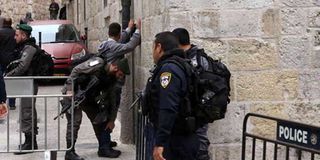Israel law tightens hold on occupied Jerusalem sectors

Israeli security forces frisk a Palestinian man as he heads to the al-Aqsa mosque compound at Jerusalem's Old City on December 29, 2017. Israel's parliament on Tuesday gave final approval to legislation aimed at making it more difficult for the government to hand the Palestinians parts of Jerusalem. PHOTO | GALI TIBBON | AFP
What you need to know:
It determines that any ceding of lands considered by Israel to be part of Jerusalem would necessitate a two-thirds majority vote in parliament.
Israel occupied east Jerusalem and the West Bank in 1967.
It later annexed east Jerusalem in a move never recognised by the international community.
JERUSALEM
Israel's parliament on Tuesday gave final approval to legislation aimed at making it more difficult for the government to hand the Palestinians parts of Jerusalem under any future peace deal.
The bill, approved by a 64 to 51 vote, is the latest blow to remaining hopes for a two-state solution to the Israeli-Palestinian conflict.
Formulated by Shuli Moalem-Refaeli of the far-right Jewish Home party, it comes weeks after US President Donald Trump's decision to recognise Jerusalem as Israel's capital sparked deadly protests in the Palestinian territories.
It determines that any ceding of lands considered by Israel to be part of Jerusalem would necessitate a two-thirds majority vote in parliament — 80 out of 120 members of the Knesset.
It also enables changing the municipal definition of Jerusalem, which means that sectors of the city "could be declared separate entities," a statement from parliament read.
Israeli right-wing politicians have spoken of unilaterally breaking off overwhelmingly Palestinian areas of the city in a bid to increase its Jewish majority.
Israel occupied east Jerusalem and the West Bank in 1967.
It later annexed east Jerusalem in a move never recognised by the international community.
It claims all of Jerusalem as its united capital, while the Palestinians see the eastern sector as the capital of their future state.
The issue is among the most contentious in the Israeli-Palestinian conflict.
"We've ensured the unity of Jerusalem," Education Minister Naftali Bennett, who heads Jewish Home, said after the vote.
"The Mount of Olives, the Old City and the City of David will forever remain ours," he wrote on Twitter.
Dov Henin of the opposition's mainly Arab Joint List said the new law should be called "the law to prevent peace".
"Without an agreement on Jerusalem there will be no peace," he said ahead of the final vote. "The law means that there will be bloodshed."
Trump's December 6 decision upended decades of precedent and broke with international consensus, but maintains that Jerusalem's final status would have to be decided in negotiations between the two sides.
The new law is however not necessarily definitive. It can be changed by a regular parliamentary majority of 61.





